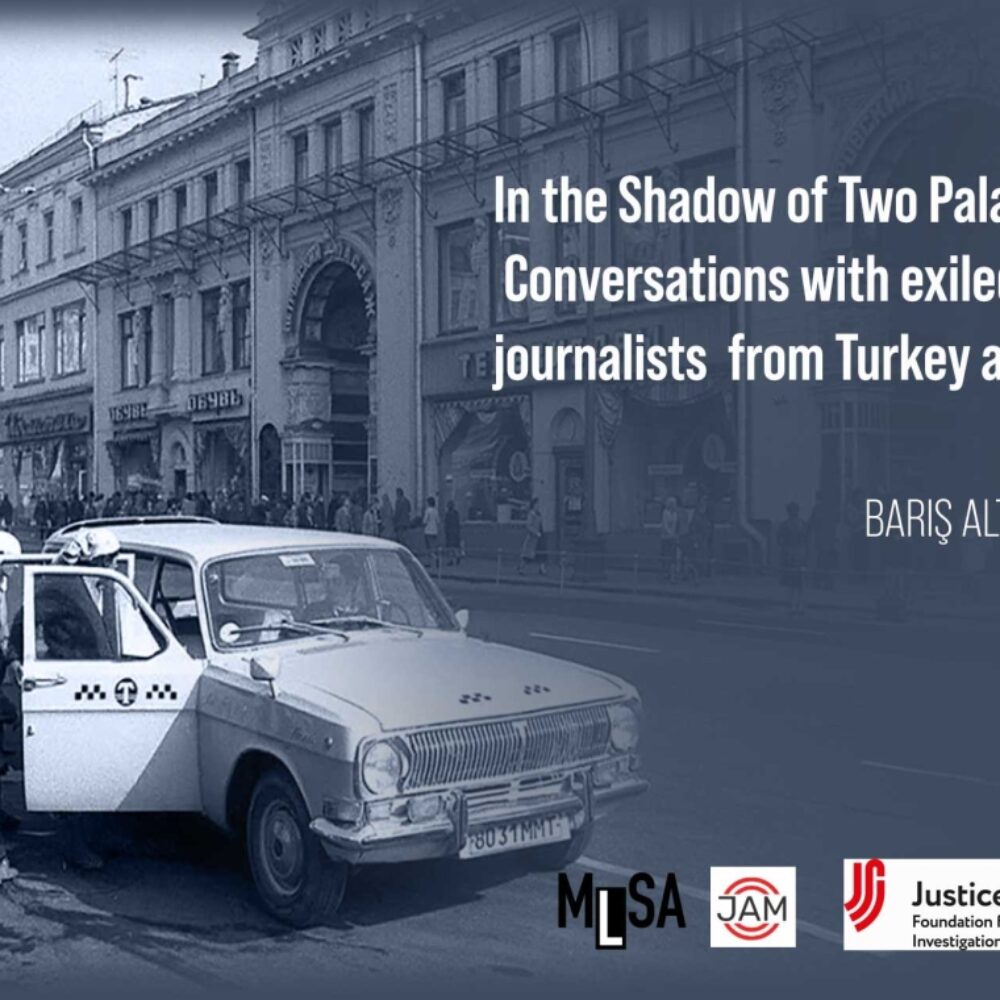THIS INVESTIGATION IS PART OF THE JUSTICE FOR JOURNALISTS FOUNDATION INVESTIGATIVE GRANT PROGRAMME AND WAS ORIGINALLY PUBLISHED BY MLSA (MEDIA AND LAW STUDIES ASSOCIATION).
A failed coup attempt. A military invasion. Charges, arrests, and fear.
Both Turkey and Russia have suffered tremendous losses in democracy and erosion of basic rights in the past two decades, starting with full media capture that occurred rather slowly. Government crackdowns in both countries have forced journalists to seek refuge from arrests and other persecution in foreign lands. Still, two key events – Turkey’s failed coup attempt in June 2016, followed by a two-year state of emergency and Russia’s invasion of Ukraine in February 2022 – have accelerated the worsening situation.
Turkey and Russia are not unique in this respect. In a 2023 article on exiled journalism, Freedom House President Michael J. Abramowitz and Senior Research Analyst Jessica White1 , note that the ongoing repression of journalists is “linked to a global decline in democracy itself, as attacks on independent media continue to increase around the world.”
However, this publication focuses on the story of these two countries where increasing authoritarianism has put in place a Sultan and a Czar, who seemingly will be around for a long, long time. They both have seen better, more hopeful times. Ironically, one of these two became a haven for those fleeing the other.
As a journalist from Turkey and co-director of the Istanbul-based press freedom organization Media and Law Studies Association (MLSA), witnessing the tumultuous shifts in the journalistic landscape leading up to and following Russia’s invasion of Ukraine and the consequent legislative changes in Russia has been doubly alarming.
Authoritarianism always needs war. And fears turned into real on February 24, 2022, when Russia started its full-scale invasion.
However, it was the Russian Duma’s decision to criminalize the use of the word “war” in describing its invasion of Ukraine that sparked the first significant exodus of journalists from the country2. Many found refuge in Istanbul, arriving without visas, any financial support, or a clear vision for their future. Istanbul, which is currently home to dozens of journalists in its prisons, became a temporary safe haven for these journalists. Istanbul was the first step on the exile journey of some of the journalists, who shared their experiences with me in this publication.
As a Russian speaker heading a press freedom organization in Turkey, I was heavily involved in trying to help our colleagues who arrived on March 4. During this time, it was impossible not to think of our many friends and colleagues who had had to relocate from Turkey. This is why we embarked on creating a documentary with our sister organization, JAM e.V in Berlin, specifically about exiled journalists from Russia and Turkey. This accompanying publication is also part of the same idea, made possible through the support of the Justice for Journalists Foundation (JFJ).
Turkey’s complex dynamics with freedom of the press and growing authoritarianism had already started a slower, steady exodus of journalists from Turkey to countries like Germany, where they sought more stable and secure environments for their work and personal lives. Some journalists who were defended by MLSA moved to Berlin long ago, many colleagues have had to leave over the years.
This publication follows the stories of 11 journalists who had to leave Turkey and Russia after tumultuous events in those countries that led to an increase in the existing crackdown on free media. It seeks not just to highlight their struggles — and resilience– but also to offer a comprehensive look into the broader implications of such mass displacement on journalism and freedom of speech and hopefully say more on what others can do to help journalists in this situation.
Several of the Russian journalists I interviewed for this publication are journalists whom I had first met in the first few hectic days of their post-war exodus. I have also included views of some of the Turkish journalists we interviewed with my partner Andrey Zhvirblis in Berlin during the last months of 2023 as part of the documentary we were filming with JFJ’s support.
From the weight of having to leave to bureaucratic and financial hurdles and to safety concerns and emotional turmoil, journalists Yuri Davydov (formerly Dozhd TV), Valery Nechai (editor-in-chief of Ekho Moskvy in Sankt Peterburg), 7×7 journalist Sofia Kropotkina, multimedia journalist Andrey Shashkov, Pskov journalist Svetlana Prokopyeva who is now working with Radio Free Europe, Alexander Pichugin, a Nizhny Novgorod-based journalist who had to choose exile, “Free Media” founder and Krasnodar journalist Mark Nebesny have shared their experiences.
Additionally, this report integrates interviews with journalists Çağdaş Kaplan, former editor-in-chief of the Kurdish daily Yeni Yaşam, freelance journalist Metin Cihan who had to leave after publicizing the truth behind the death of an 11-year old, veteran TV journalist Banu Acun faced with no options to continue journalism in Turkey due to unrelenting media capture and Baransel Ağca, who faced legal trouble in Turkey over his reporting of an alleged murder in Erzurum.
Writing for a general and international audience, I avoided going into details about specific events in the recent histories of these two very complicated countries. Still, I tried to provide background information related to specific concepts and events that affected the journalists and the media landscape in the countries for readers who might be unfamiliar with either of the two countries.
Through these narratives, I wanted to present not just stories of displacement and challenge but also of resilience, adaptation, and the relentless insistence on not cowering before power and commitment to freedoms and rights that I believe are key to a life of dignity.

